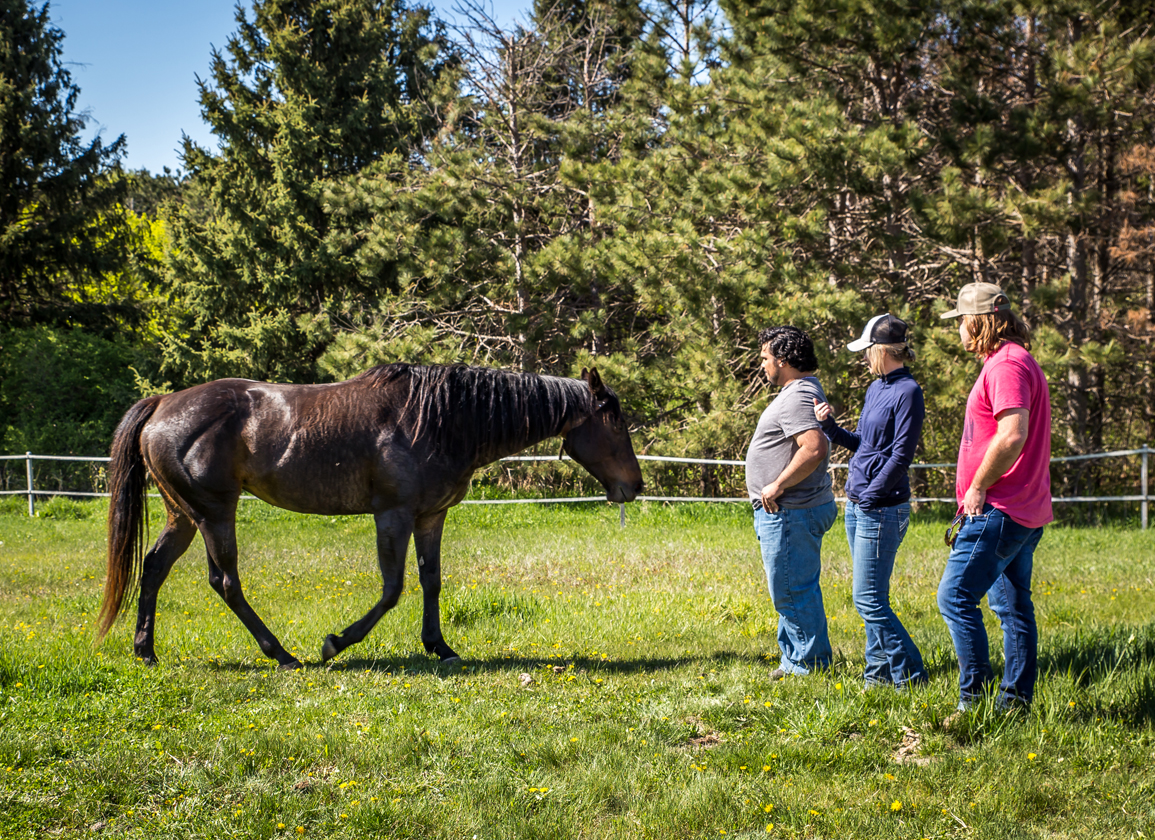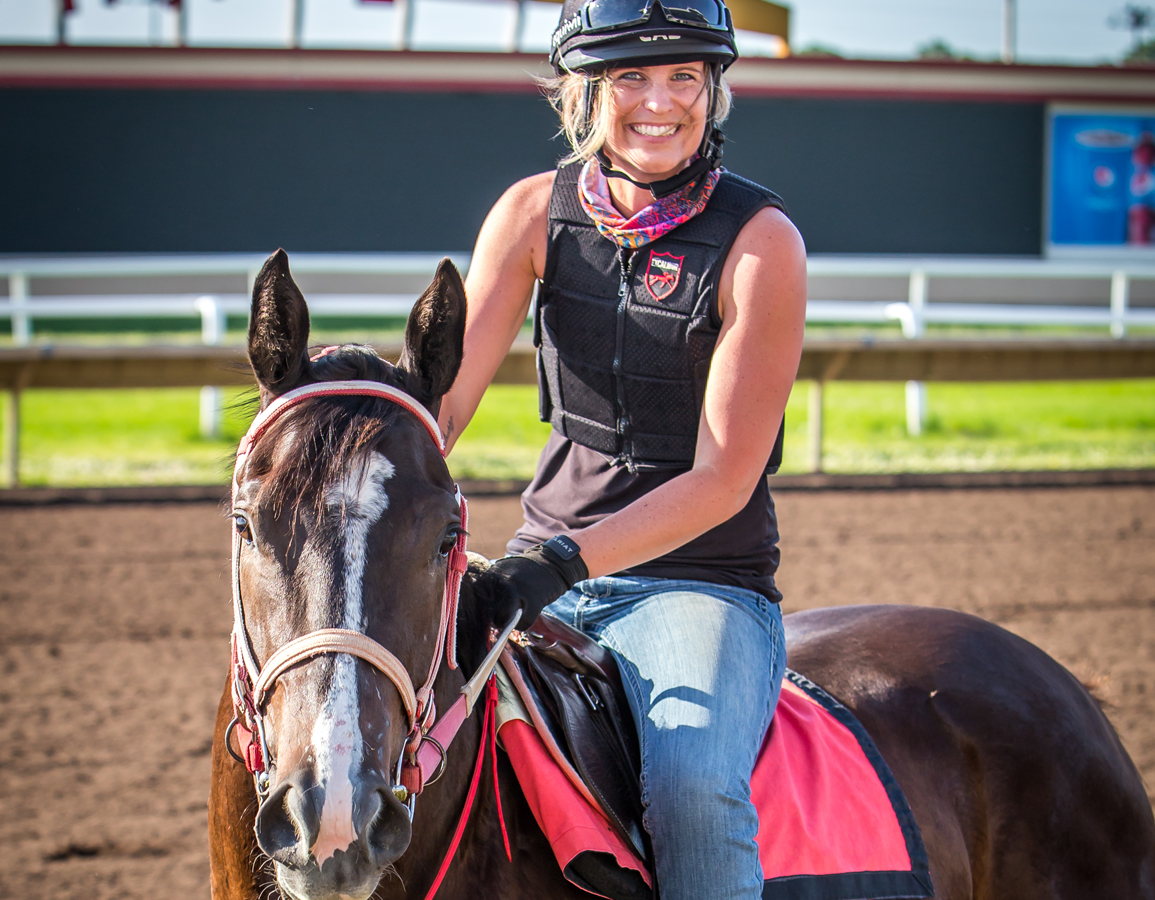While racing seems to be scrambling for any piece of positive public perception it comes across, Sally Jane Mixon has a vision. She wants to save the lives of people across the country, and she wants to do it by bringing them to the backsides of racetracks to work with retired racehorses.
“Mental health is a huge crisis right now everywhere you go,” Mixon said. “The hope is to bring people who maybe have a bad taste in their mouth for racing and they'll come and work with off-track Thoroughbreds and their lives will be changed–at a racetrack, with horses that have raced.”
This summer, Mixon's vision came to life with the launch of Abijah's on the Backside– a therapy and wellness center nestled on a quiet piece of the backside at Canterbury Park. There, a pair of retired racehorses reside and engage with people struggling with anything from PTSD and anxiety to depression and suicidal ideation through Equine-Assisted Psychotherapy. Through this form of therapy, individuals have the opportunity to step into an experience and 'see' their behaviors and how those behaviors impact themselves and others around them.
Abijah's on the Backside began holding sessions in June. Initially, it was reserved for members of Canterbury's backside community, but it has just recently opened to the broader public in Shakopee, Minnesota. Mixon, who works alongside Abijah's Vice President of Development Dani Palmer, said their long-term goal is to open Abijah's on the Backside locations at tracks across the country.
“There could be hundreds of people a week eventually coming in for sessions at a racetrack,” she said. “It's a really unique way for racetracks to gain amazing public awareness in a positive light and for people to see that horses nobody knows that name of that can't race anymore are just as valuable as a Triple Crown winner because they're now saving lives.”
Mixon's vision for this unfolding project has developed slowly over her lifetime.
She remembers first taking an interest in racing as a child watching Winning Colors win the Kentucky Derby in 1988. While in high school, Mixon started struggling with an eating disorder. By the time she was in college, it got to the point where she was forced to drop out and go to an in-patient program.
“That's where God really got a hold on my heart,” she said. “Horses have always pulled me out of stuff and reminded me of my faith. That's where the name Abijah's Hope came from. Abijah was the first horse I ever owned and it's Hebrew for 'The Lord is my Father.'”
By working through her own struggles, Mixon developed a passion for helping others going through similar challenges. She eventually earned her Masters in Professional Counseling and started working with incarcerated youth.
When she and her husband moved to Atoka, Oklahoma, she met Jeff Lukas, the son of Hall of Fame trainer D. Wayne Lukas. Mixon and Lukas bonded as he regaled her with stories of her childhood heroine Winning Colors, as well as the many other Lukas stable stars.
“Jeff became a really close friend of mine,” Mixon recalled. “We would spend time in his living room talking about how horses were so important to him and his life. Through that and through having my own experience with mental health and knowing how horses, especially Thoroughbreds, can work their magic, I started the vision for Abijah's Hope.”
Mixon later moved to Minnesota and got connected with Acres for Life, an organization in the state that has provided equine-assisted psychotherapy for over 20 years. She eventually took on the role of their Chief Development Officer, but knew if she wanted her vision for Abijah's on the Backside to come to fulfillment, she would need to get connected at Canterbury Park.
“I asked [former jockey] Mark Irving if he could let me in on the backside because I wanted to tell people about my vision for Abijah's. I started walking around telling people about it and was told I needed to meet [trainer] Bernell Rhone and his right-hand guy Martin Escobar. They asked me if I could ride, so I started ponying and they taught me how to gallop.”
Mixon has been an exercise rider at Canterbury for three years now, planting seeds throughout Canterbury's racetrack community on the launch of Abijah's on the Backside along the way.
Her next step was to get funding. She met Joe Scurto, Executive Director of the Minnesota Racehorse Engagement Project, and told him about her vision. To Scurto, the program sounded like a win-win for them both.
“I'm constantly looking for opportunities to find second careers for racehorses,” Scurto said. “It's easy to find homes for that 3-year-old coming right off the track, but it's harder for the 10-year-old that maybe has a bad ankle. I started talking with Sally and it was a perfect opportunity to ask her if we could use Thoroughbreds exclusively for her program.”
Mixon and Scurto shared their idea with Canterbury Park, the Minnesota Racing Commission and the Minnesota HBPA.
“Everybody came together and stepped up,” Scurto shared. “It was really collaborative. It's hard to get people to sign checks, but everyone thought this would be terrific for the stable workers.”
Mixon said they had always planned to keep the program initially exclusive for the track's backside workers.
“There's not a whole lot of support for them,” she said. “With having a program like this literally at the backside of the racetrack, it's home for them. It's an awesome sport, but there's a lot of pressure. You think about an exercise rider that has a tough fall. It's traumatizing, but you have to get back on to get paid. So there's anxiety, there's PTSD, there's all these things that we can help and support them with so they can be a better exercise rider, a better groom, a better jockey. Whatever it is, they can be more successful which helps the entire industry become healthier.”
Mixon has been asked the obvious question hundreds of times. For people who work with horses every day, how is this equine-centric program going to help their mental health?
She got her answer from a backside worker who opened up to her team after his first session this summer.
“He told us, 'This has been my work for 21 years. Now these horses that have supported me monetarily and helped me give back to my family are going to be a part of my healing.' In that moment with this individual, it was a different perspective because horses have shown up for these people their entire lives but in a different way. Now they're going to be part of their healing as well.”
During each session, clients will undergo an assessment before stepping into the paddock to work with the horses alongside an equine specialist and mental health professional. All activities take place on the ground and no prior experience with horses is required.
“We believe that in the model we use, stories matter,” Mixon explained. “We start getting to know their story and the characters in their story and then the horses become that. It might be addiction. There might be a horse that continues to move into the client. They're big, they can't push them away and finally there's this click and they realize, 'this is my addiction.'”
One of the most fascinating aspects of this type of therapy, according to Mixon, is that the horses respond differently for different people.
“They're picking up things inside the person and it's like they play it out in front of us. I've had someone struggling with major depression and suicidal ideation. When they step into the space, all the horses lay down and the person actually sees their story unfold outside of themselves. So now their depression isn't in them and we can talk about what's out in front of us. It's so powerful.”
Canterbury's Abijah's on the Backside is located on a quiet portion of the backside behind the chapel. Sessions begin every morning after training has concluded.
“Canterbury has been amazing,” Mixon shared. “They've made sure it's private, it's HIPAA compliant and it's not like a shaming thing to go back there, it's a positive thing. They've been amazing in marketing it and spreading the word across the backside.”
The first horse to join Abijah's program, a mare named Dangerous Wave (Graydar), raced exclusively at Canterbury Park in her seven career starts. As a juvenile in 2018, she won the Northern Lights Debutante S. and retired the following year. Mixon worked with the Bernell Rhone trainee during her time on the racetrack and knew she would be perfect for the program.
“She's sassy and she tells you what she wants when she wants it,” Mixon said with a laugh. “Some people who knew her as a racehorse have asked, 'Really? She's going to do therapy sessions?' But she's been phenomenal. She was one of the toughest horses to gallop but you get her in these sessions and she's a puppy.”
An important aspect of getting Abijah's on the Backside up on its feet has been Mixon's connection with the backside community through working alongside potential clients every morning.
“I'm not their therapist; I'm their friend,” she explained. “I ride with them in the morning so I can be that bridge and help them get connected with my team.”
Another important key, Scurto added, has been the support of Canterbury's racing stewards, who have directed workers facing potential license removal or fines to Abijah's.

Mixon's goal is to have Abijah's on the Backside locations at racetracks across the country | photo courtesy Abijah's on the Backside
“I was always aware of the substance abuse issues that exist in the stable areas and our stewards here have been very helpful because they would rather send individuals to be evaluated rather than just taking away their license to work,” Scurto said. ” To me, that helps keep people in our stable area which we so desperately need and it provides support.”
While Canterbury has conducted substance abuse support programs annually, Abijah's on the Backside is unique in that it will provide year-round opportunity for workers to receive help even when live racing is not running at Canterbury.
While the program is only a few months underway, Scurto has already heard glowing reviews as word spreads around Canterbury and the city of Shakopee.
“I was concerned that people might not step forward because of the taboo of getting help,” Scurto admitted. “But what I'm hearing is that people are really stepping up. There's no doubt a need, but it's going to be a culture change in the stable areas. Having it right here and accessible is going to be a big step up.”
Now that Canterbury's race meet has concluded, many of the workers who have been undergoing sessions throughout the summer are following the horses on to the next track. Mixon's goal is that in the future, wherever they go next will also have an Abijah's on the Backside where they can continue their sessions.
“The hope is that there will be Abijah's on the Backsides at different tracks across the country,” she said. “So if someone starts sessions and then they're heading to Tampa, for example, I can call up my team there and they can pick up their treatment so that everywhere they go they feel like they have a home, a place to land, at Abijah's.”
Eventually, the plan is for each location to open to the public to help people overcome personal challenges while simultaneously undergoing a life-changing experience through working with Thoroughbreds at a racetrack.
“When racing has done well, it's the best thing in the world,” Mixon said. “Everyone has a shot, and that's a rare opportunity. A lot of the people I've worked with feel like underdogs–like veterans or backside workers. There's this parallel between these people and retiring Thoroughbreds that we don't know what to do with.”
“With this model, these off-track Thoroughbreds become characters in people's story. I've been doing hundreds of sessions and have watched miracles happen. If off-track Thoroughbreds can do this work, why not bring it to the racetracks where they have the barns and they have the set up? How could you hate racing if you can look at what these tracks will be doing?”
Interested in supporting Abijah's on the Backside? Click here.
The post Abijah’s on the Backside Changing Lives at Canterbury Park appeared first on TDN | Thoroughbred Daily News | Horse Racing News, Results and Video | Thoroughbred Breeding and Auctions.


